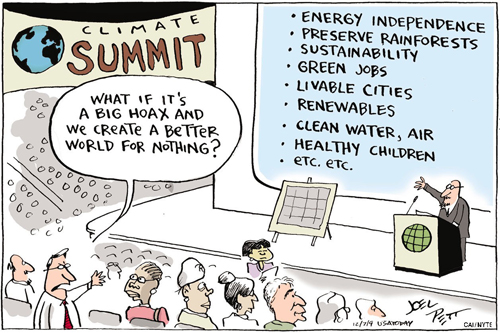The U.S. Environmental Protection Agency itself acknowledges
the continuous breakdown of our Earth’s natural environment and the dangers
that it imposes. On the EPA’s website, a page dedicated solely to future
climate change lists the key U.S. and global projections on issues such as
temperature, precipitation, ice, and sea level changes. These include:
- Southern U.S. states are expected to experience 2x more days with temperatures above 90°F in a high emissions situation.
- As the ocean warms the intensity of hurricanes will increase.
- Ocean acidification will severely harm marine species.
- Snow cover in the Northern Hemisphere will decrease by 15% by 2100.
There is an overwhelming amount of scientific data from both NASA and NOAA as well that support these predictions. How close these predictions are and how strongly the climate is affected depends on the amount of greenhouse gases in our
atmosphere. If this is so, why is it taking the U.S. so long to get on
top of their game? A recent small study by Duke University points to “solution aversion”,
a phenomena that occurs in many common political disputes.
Solution aversion, in simple terms, is ignoring the problem because the solution is undesired. For example, what is a popular solution to the climate issue? More government regulations. What do Republicans generally oppose? More government regulations. What do we do then? Ignore the problem cuz the solution suks!
In the study, Republicans and Democrats read a statement claiming "global temperatures will rise 3.2 degrees in the 21st century." When the proposed solution was some form of government regulation, only 22% of Republicans said that the temperature would really rise that much. When the solution was "the free market, such as with innovative green technology", 55% of them agreed with the statement. No notable change was recorded for the Democrats.
So what's the solution? The solution lies within us the people that will be affected by our government's inaction. We can either get our government to start banging out bills or leave them be until it's too late. It's like watching a test date inevitably approaching, but doing nothing to prepare for it. We know the consequences, we can see it slowly happening in our life times right now, but still we do nothing and when the test date finally arrives, when it's finally too late to do anything, there is nothing we CAN do. And what are we left with? A big fat F across the whole Earth.



Solution aversion definitely describes Congress. I like the cartoon.
ReplyDeleteDid you know that you can create short links with Shortest and receive cash for every click on your shortened links.
ReplyDelete